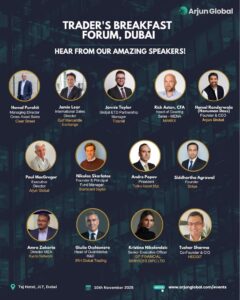Emerging markets are not just the “next” wave- they are the wave.
As we approach 2026, the global economic spotlight is shifting decisively toward dynamic emerging economies. Among them, the Middle East and North Africa (MENA) region is increasingly taking centre stage- redefining global growth patterns through diversification, digital innovation, and cross-border investments.
A New Growth Geography
The world’s traditional engines- such as the U.S., China, and Western Europe- are stabilising after decades of rapid expansion. In contrast, emerging markets across Asia, Africa, and the MENA region are experiencing accelerated growth, driven by youthful populations, strategic reforms, and transformative infrastructure investments.
According to IMF projections, emerging markets are expected to account for over 70% of global growth by 2026, led by Asia and the Middle East. The conversation is expanding- beyond China and the U.S. to include India, Vietnam, Indonesia, Saudi Arabia, the UAE, and Egypt. These nations are not merely following trends; they are setting them- reshaping global supply chains, consumption, and energy transitions.
The MENA Momentum: From Oil to Opportunity
The global growth forecast stands at roughly 3.1% in 2026, while emerging economies are expected to grow at an annual rate of 4.06% through 2035, compared to 1.59% for advanced economies.
The centre of gravity is shifting toward the Global South- and for investors, businesses, and policymakers, this means rethinking strategy and exploring markets beyond the traditional giants. The MENA region is increasingly at the forefront of that conversation.
Once defined by hydrocarbons, the Middle East 2.0 is now a story of diversification and digitalisation. Gulf economies are emerging as innovation and logistics powerhouses, bridging trade between Asia, Africa, and Europe.
- United Arab Emirates (UAE): With Dubai positioning itself as a global business and technology hub, the UAE is leading in digital transformation, renewable energy, and high-value tourism. Mega events and infrastructure expansion are solidifying its role as a gateway between Asia and Africa.
- Saudi Arabia: Vision 2030 reforms are reshaping its economy, channelling massive investments into renewables, NEOM smart city projects, sports, and cultural tourism.
- Qatar and Oman: Both are emerging as logistics and financial hubs, leveraging strategic connectivity to attract global capital and trade.
- Bahrain: With one of the region’s most liberalised economies and a growing ecosystem for startups, the Kingdom of Bahrain is attracting investors seeking regulatory transparency and innovation-friendly policies. A key financial nerve centre of the Gulf, Bahrain continues to position itself as a hub for banking, fintech, sustainable finance, renewable energy, and human-capital development.
- Egypt and Morocco: Fast-growing industrial and renewable energy sectors, alongside significant port developments, make North Africa integral to the Mediterranean-Africa-Gulf trade corridor.
Collectively, these nations are shaping a region beyond oil, where digital innovation, green growth, and cross-border trade are setting new benchmarks for emerging economies. For investors, this is more than a cyclical rebound- it’s a structural transformation.
Key Growth Sectors Redefining the Global Order
Across emerging markets- especially within MENA, several high-impact sectors are shaping the next decade:
- Renewable Energy & Green Hydrogen: From Saudi Arabia’s NEOM to the UAE’s Masdar initiatives, renewable and hydrogen projects are reshaping the energy narrative.
- Digital Economy & Fintech: The Gulf is home to some of the fastest-growing digital payment and startup ecosystems globally.
- Infrastructure & Logistics: Mega ports, smart cities, and trade corridors are cementing the Middle East’s role as a global hub.
- Healthcare & Biotech: A young, expanding population and rising income levels are driving healthcare innovation and medical tourism.
- Tourism & Real Estate: Nations like Saudi Arabia, the UAE, and Egypt are transforming their skylines to attract new global audiences.
Dubai as the Crossroads of Growth
As Dubai prepares to host global investors, policymakers, and innovators, it stands as the natural meeting point for the world’s emerging economies.

The upcoming Arjun Global event in Dubai will explore exactly this- how emerging markets, particularly across the MENA region, are not just participants but architects of global growth.
The event symbolises more than a conference- it’s a dialogue on how emerging markets, led by the MENA region, will drive inclusive, resilient, and sustainable global growth.
From Dubai’s skyline to Riyadh’s megacities, a new growth narrative is unfolding- one that blends youth, digital ambition, and economic vision into a shared future.
(Disclaimer: The content provided in this article is for informational and educational purposes only and does not constitute financial, investment, or trading advice. Arjun Global does not make any guarantees regarding the accuracy or completeness of the information provided, and shall not be held liable for any losses or damages arising from reliance on the content. Always conduct your own research or consult a qualified financial advisor before making any investment decisions.)





